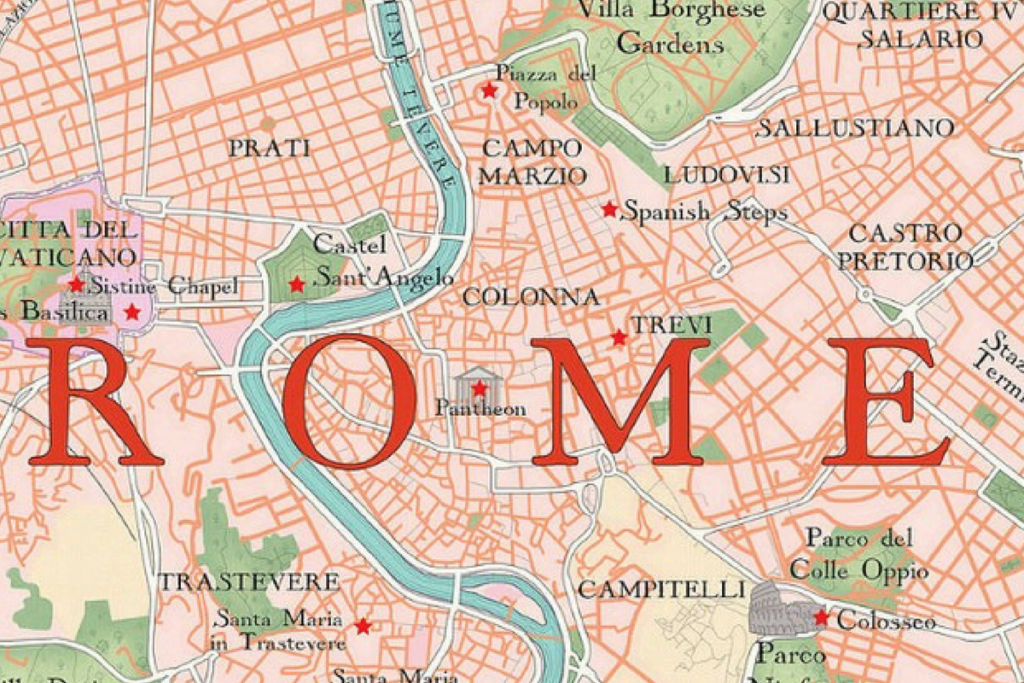Upgrade Your Mental Maps

Over the last three weeks, I’ve been in Europe enjoying the highlights of Italy, France and hiking up and down the Alps on a ‘Tour de Mt Blanc’.
I’m not sure if it was brave or foolhardy, but last week we hired a van in Rome to drive up to Tuscany. Thank God for GPS! If we’d had to rely on the paper map in my guide book who knows where we’d have landed!
Yet even a GPS isn’t fail-proof. On a couple of occasions, we ended up on a one-way street… headed the wrong way! I’m sure you’ve had similar experiences yourself.
Likewise, as we set out each morning in the Alps, rarely did our map help me foresee how hard the climbing would be.
Which brings me to an important lesson for travellers and life alike: the map is not the territory.

How we think it is – in our head or on a map – is often not how it really is. We can so easily live with a set of unquestioned beliefs, assumptions, and ‘stories’ about ourselves and the world around us that can derail our decisions, limit our actions and land us in some place we don’t much like. I’m sure you can think of people who do just that. What’s harder is seeing where you’re doing it yourself!
Of course, there’s a good chance that many of your mental maps do precisely what they’re meant to do – help guide you from your current Point A to your desired Point B – to enjoy more love (and less conflict) in your relationships, raise responsible kids, stay healthy, create financial freedom, move forward in your business or career and bounce back from your disappointments and setbacks along the way.
If they do, these maps are working for you.
Other times, particularly when you find yourself in unfamiliar territory like me making my way through Rome or through the medieval towns of Tuscany, your mental maps can give you a bum steer… down a dead end or simply back to the same place you’re trying to get away from.
Needless to say, these maps are not working for you.
So if you aren’t happy about an aspect(s) of your life right now, then consider that it’s because you are using a faulty map; one that is out-of-date, incomplete, inaccurate or ‘all of the above’. It can leave you looking at a problem and thinking there is no other way to deal with it when, in fact, there’s a lot more avenues available to you that lay outside your awareness (that aren’t on your map!).
You simply don’t know what you don’t know!
If you sense that doing more of what’s already not working isn’t going to help you, I hope the four-step process below, adapted from the chapter in Make Your Mark titled Upgrade Your Mental Maps, will help you make braver and better decisions and help you get to where you want to go a whole lot faster and with a whole lot less stress!
You alone are the ‘captain of your ship’ and so you alone must take responsibility for the map you’re using to navigate through life. If you don’t, you run the very real risk of moving forward with blinkered thinking, repeating self-defeating cycles of thought and behaviour, and dealing with the same problems again and again. (And you don’t want that now do you?!).
Now find some time, get out a pen and paper and see where you may be moving ahead using an old map. I promise you, it will be time well spent!
1. Create a compelling future (where do you want to go?!)
Vision = Power. Anytime you lack clarity about what you truly want, you can end up someplace you don’t much like. Invest time to connect to the biggest and most compelling vision for your life five years from now. Write down what you would be doing, who you’d be doing it with, the value you’d be adding, the emotions you’d be feeling, the legacy you would be creating and what people around you would be saying about you. If you’d like some more help in doing this, please check out my new Life Compass Course.
2. Challenge your stories
Your stories are like little signs saying “Road closed” or “Detour ahead” that can keep you from going down the very road you need to take.
The stories you tell yourself — about what you can and can’t do, about who you are and who you can become — shape your life. Every story you tell (and you tell plenty, all the time) triggers and amplifies the emotions you feel and the actions you take. If you think you cannot possibly change an aspect of your life that is pulling you down, then you’ll live in resignation, resentment and won’t bother trying.
Likewise, if you tell yourself you haven’t yet figured it out but that if you persist and be brave and are open to learning then it will fuel ambition and self-belief and eventually you will achieve so much more than you ever otherwise would. So…. where are you living in a story that is keeping you stuck, fuelling fear, blame, doubt, despair, resignation or resentment? What new story would you need to tell yourself in order to manifest your biggest vision?
3. Shelve your “shoulds”
At the end of life, many people regret that they lived the life others felt they should live, not the one they truly wanted to live. Such is the power of our “shoulds”. Of course, we all have “shoulds” — like where we should study, which career we should pursue or how we should raise our kids — but we often don’t realize that they are often a far stronger reflection of other people’s expectations, fears, beliefs and values than our own. What would be possible if you decided to let go of what you thought you should do and just did what you truly wanted to do, what would you start doing and what would you stop doing?
4. Exit the safe lane
Fear is wired into our psychological DNA to steer us away from threats and toward comfort and safety. Yet left on autopilot, fear can keep us living in the “safe lane” of life, unwilling to take the very actions needed to build a rich and rewarding life. Fear drives us to overestimate the risks and underestimate our ability to handle them. It’s why we must be vigilant to focus not only on what we could lose if we take a risk but also what we risk losing if we play it safe and stick with the familiarity of the known.
Close your eyes, put your hand on your heart and step into the shoes of you at age 90, looking back on the journey that was your life. Then, tapping your own inner ‘Braveheart’, ask yourself, if you stay on your current path, what might you one day regret not doing? Where do you need to veer out of the safe lane of life and into the brave lane? More so, what price will you pay if you don’t? Fear regret more than you fear failure. At the end of life, most people regret far more the risks they didn’t take than those they did.


